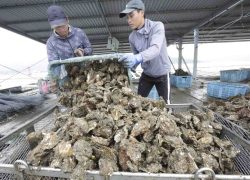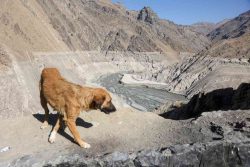
Waiters pick up beer steins at the end of Oktoberfest, in Munich on Oct. 3.
13:53 JST, October 20, 2023
PARIS (AFP-Jiji) — Climate change threatens the cultivation in Europe of aromatic hops which gives beer its bitterness, according to a study published on Oct. 10 in Nature Communications.
European varieties of hops are prized and used by brewers around the world, but rising temperatures and less rain are reducing yields and the concentration of the compounds that provide beer its refreshing flavor.
The researchers observed this trend by analyzing data from five sites in the Czech Republic, Germany, and Slovakia, which along with Poland are the primary hops growers in Europe, study coauthor Miroslav Trnka said.
Yields fell between 9.5% and 19.4% at four sites and were stable at a fifth when data from 1995-2018 was compared with 1971-1994.
Meanwhile the concentration of the bitter compounds, alpha acids, decreased.
Extrapolating from the data, the researchers predicted a further drop in yield of between 4% and 18%, compared with 1989-2019 while the concentration of alpha acids could drop between 20% and 31% as temperatures rise and rainfall is impacted.
With droughts expected to increase in central and southern Europe “it will be necessary to expand the area of aroma hops by 20% compared to the current production area to compensate for a future decline in” potency and yields, said the study.
It called for “urgent adaptation measures to stabilize international market chains” such as moving crops to more suitable areas or irrigating.
Hop farmers are trying to adapt, but Trnka said their options are limited as “hops needs a specific combination of climate and soil” and the introduction of genetically modified plants designed to better support warmer temperatures and drought is prohibited in Europe.
Brewers can also try to modify their methods to adapt to the reduced bitterness in hops.
Top Articles in Science & Nature
-

Japan Institute to Use Domestic Commercial Optical Lattice Clock to Set Japan Standard Time
-

iPS Treatments Pass Key Milestone, but Broader Applications Far from Guaranteed
-

Record 700 Startups to Gather at SusHi Tech Tokyo in April; Event Will Center on Themes Like Artificial Intelligence and Robotics
-

iPS Cell Products for Parkinson’s, Heart Disease OK’d for Commercialization by Japan Health Ministry Panel
-

Japan to Ban Use of Power Banks on Airplanes
JN ACCESS RANKING
-

Japan PM Takaichi’s Cabinet Resigns en Masse
-

Japan Institute to Use Domestic Commercial Optical Lattice Clock to Set Japan Standard Time
-

Israeli Ambassador to Japan Speaks about Japan’s Role in the Reconstruction of Gaza
-

Man Infected with Measles Reportedly Dined at Restaurant in Tokyo Station
-

Videos Plagiarized, Reposted with False Subtitles Claiming ‘Ryukyu Belongs to China’; Anti-China False Information Also Posted in Japan
























